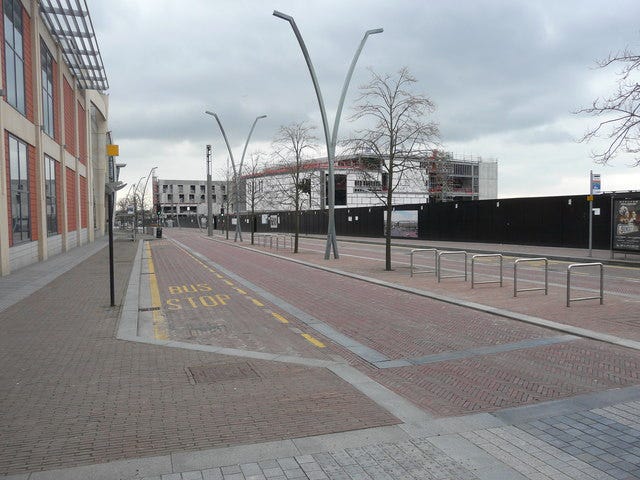If you don’t drive, then entire terrains will forever remain unknown to you. Unaware, they exist, even while we make faint contact with the rot of their fringes. A parcel arrives in the dead of night at a Distribution Centre and folds through time and space. It arrives in your hand, in your sweating morning lap. It came from somewhere. Somewhere close, yet far away. When you drive, you enter spaces that are only really activated for the car, and for everything that it enables and contains. Sheds. Warehouses. These things are obscure, even while they service you. Drive on. Blink. Blink again.
Ashford happens by accident. It happened by accident to me, a passenger in a car, seeking solace on the very edge of England. A day trip to Dungeness takes us on a slow and grinding descent through the worsted subtopias of Enfield and Sidcup. Long, fearless roads of worn tarmac and greasy plane trees lined with fat, fastidious Tudor mockery. Petrol stations, car dealerships, distribution sheds. An Amazon warehouse whose gigantism rouses something like beauty from its deeps - striped in blue-white gradient, so as to make it disappear into the air.

The land that Blair built. Maybe.
Ashford happens suddenly. A Deliveroo rider struggles on sticky pedals over the mouth of a dual carriageway. A series of nested roundabouts and circulatory roads which trigger memories of faded places seen at the very outer edges of national transit maps. Isles of water; port towns, inlets, bristling and barricaded with warehouses and siding sheds.

Ashford bends, until it breaks. A series of boughed and upsetting ‘designer lampposts’ illuminate the streets of its award-winning ‘shared space’ scheme, because the lightbulbs of these lights are no longer manufactured. This story broke in 2010, but the lampposts remain.
Ashford erupts, in slow motion. A landscape whose seed is a PFI scheme, a Unitary Planning Document, a white paper, a handful of blood. Ashford looks like everywhere else while also managing to elevate itself into a condition of banality so strenuous that it becomes unique. Ashford is like nowhere else on earth precisely because it is everywhere else on earth.
Ashford is sheds, trussed up as explosions - frozen in time. Plastic, filleted, textural, irregular. Dragging deeply on the cigarette of Constructivism, what comes out is a throaty splutter, coughed up in the face of the ‘disruptive’ aesthetics of heinously plagiarised Liebeskind and Eisenman. Plasticy curtain walls jut out from bland box apartments. Circular squat towers come wrapped in tobacco-stained cladding. Along Elwick Road, the central spine of the council’s shared space scheme, each building seems to hurtle away on its own lurid trajectory without reference to those with which they supposedly share space. It creates a sense of farcical and uneasy absence. A failure of continuity, a bemusement of senses. At its heart is the vast undulating slug of the Elwick Centre, a mixed-used entertainment scheme splattered in unenticing sloughs of dim gold metal, pushed out like over-full stomachs. You’ve got to sigh.
Ashford is creeping disorientation, in so far as these fringe spaces have the capacity to smear and spread. Littoral areas of warehouses and blank facades and plastic in-fill have streamed along service roads and crept into the centre of the town, disorienting everything. The centre comes to feel like the very farthest periphery. Everywhere feels exactly like nowhere. Some poorly brick things survived the slaughter, though knee-capped and dismal.
Some parts stand out. Remain somehow lodged in my memory. A tackily fun ‘Constructivist’ car park, bookended by faceted towers which nod - very distantly - to Ilya Golosov’s 1929 Zuev House of Culture. In Moscow.

A car park in PFI Constructivism (actually good)
The scolding drabness of Ashford. The interiority of it. The roadiness of it. Everything points away, frantically, from its centre, even while it is captured in the process of its own self-cannibalizing feast. You drive. You drive. You stop. You ache. You leave. Really that is the only option. The only release. Or death. Yes, or death.

